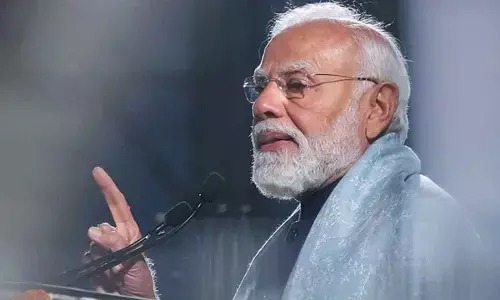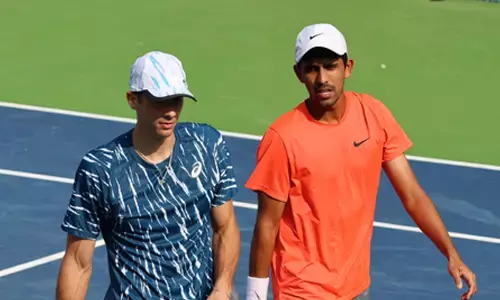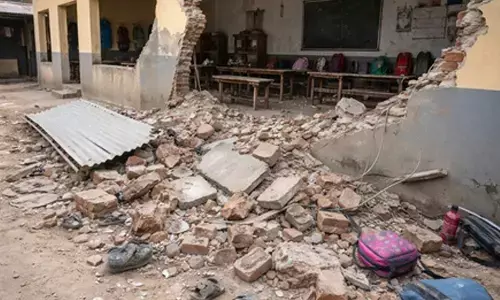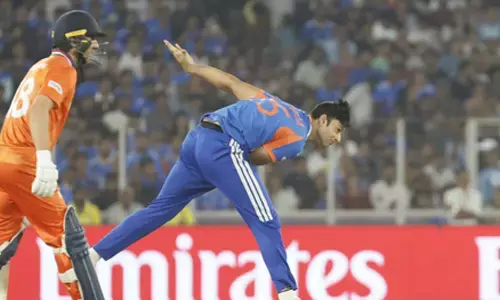Debate ballasts democracy
Debate ballasts democracy, Bifurcate a State, Ramachandra Murthy. The slugfest in Andhra Pradesh Assembly will go on till the 23rd. It will continue even after the Assembly session.
Debate or no debate would not make anydifference to the constitutionalprocedure, though it would be in badtaste to bifurcate a State even without a debate in the Assembly
The slugfest in Andhra Pradesh Assembly will go on till the 23rd. It will continue even after the Assembly session. To paraphrase Bill Clinton’s famous quote, it is all about the elections, stupid. The battle of wits is not between the ruling party and the main Opposition party. It is between Chief Minister Kiran Kumar Reddy and YSRCP president YS Jaganmohan Reddy.
The inscrutable ways of Kiran Reddy continue to baffle Congress men and political observers. Kiran Reddy has been walking since July 30, when a decision to create a separate State of Telangana was taken by the Congress Working Committee, on a razor’s edge with aplomb. He appears to have a two-pronged agenda. He would help debate on the AP Bifurcation Bill, 2013, while appearing to be bitterly opposed to bifurcation. If what Digvijay Singh, AICC general secretary in charge of AP affairs, and Ghulam Nabi Azad, Union Health Minister, who was monitoring AP affairs till the former took over, said is anything to go by, Kiran Reddy has been trying to project himself as rebel Congress leader while, at the same time, facilitating the agenda set by the UPA-II. Whatever Kiran Reddy said during the media conference on Wednesday fits into this scheme. He said he is fighting against the decision of his party and the UPA-II government to bifurcate AP.
It was a decision taken after every major party in the State expressed its opinion in favour of bifurcation, he said. Since January 3, when the Assembly was reconvened for the debate on the Bill, the chief minister has not spoken on the floor of the House. He chose to talk to media persons after the House was adjourned for Thursday. As leader of the House, he has a responsibility to lead the debate. Instead of doing that, he is indulging in monologues in media meet where no one would question, disturb or counter him. He could have said on the floor of the House whatever he told the media persons.
Kiran Reddy wants to keep the option of floating a party open. His reference to the employees is intended to keep the people guessing about the possibility of his floating a party very soon with the support of the employees. It is necessary for him to keep the flock together and keep the chair as long as he can. He made it abundantly clear that the employees are with him. He also appealed to the Opposition parties to participate in the debate. Vatti Vasanth Kumar, Minister of Tourism, who is considered to be close to the Chief Minister, spoke in the Assembly on Wednesday making it clear that the debate on the Bill had started.
The TDP also showed its inclination to follow suit after Finance Minister Anam Ramnarayan Reddy assured that he would arrange to supply the information the party was seeking. Vundavalli Arunkumar, MP, and others like Raghuveera Reddy and Gade Venkata Reddy also made statements supporting the argument in favour of a debate. It is recognition of the responsibility of the legislators to debate on the Bill referred to them by none other than the President of India. It is also an opportunity to put forth their viewpoint vehemently on the floor of the House. Those who are of the opinion that the State should be one can argue coherently and forcefully against the Bill. Any intelligent and persuading speech in the Assembly or the Council would be heard by people all over the State with respect. They are fed up with politics of one-upmanship, tactics and counter-tactics adopted by politicians.
The shenanigans have only bred ill-will among the people of both the regions. This is surely not the way to keep the people united. The Speaker of the Assembly and the Chairman of the Council were not able to conduct debate on the Bill even for five minutes in five days. We are left with two more weeks before the deadline set by the President for completing the debate and returning the Bill to him ends. There is still enough time for any meaningful debate, if the members are serious about it at least now. It is better than never. Debate or no debate would not make any difference to the constitutional procedure, though it would be in bad taste to bifurcate a State even without a debate in the Assembly.
The makers of the Constitution could foresee a situation where the majority in the A s s e m b l y would not allow the minority to have its way. But they evidently failed to visualise a situation where the majority would stall the debate altogether. Even if the debate is allowed, whatever amendments that are suggested in the debate by MLAs or MLCs can only be considered by Parliament. Debate will help people of both the regions know the nature of the Bill and the consequences that could be expected. If in-depth study of the Bill leads to some lacunae, it will help Parliament in removing them.
Even for Parliament to know the loopholes that might be there in the Bill, the members from both regions have to speak out frankly and objectively. In the absence of any such exercise, Parliament will not have many issues to discuss or suggest amendments. The Bill will be passed with all the defects intact. Would it help the cause being championed by those who have been stalling the proceedings in the legislature? By preventing debate on the Bill we are proving to the world and to ourselves that we cannot live together in harmony. That the Telugus are experts in self-destruction is being demonstrated beyond doubt.
The cacophony that has been going on has established that the majority will have its way and minority can never have its voice heard. This is one of the points made by the Telangana protagonists to buttress their demand for a separate State. The Seemandhra MLAs who constitute a majority in the Assembly and the Council will not allow the Bill to be debated. The minority, comprising MLAs and MLCs from Telangana, can never get a debate going without the support of their counterparts from Seemandhra. The essence of democracy is persuasion, accommodation and reconciliation.
The minority point of view has to be considered by the majority. Only then the minority would feel secure. The majority should have patience and perseverance to argue and prove to the minority that its views are not correct or approve the minority’s viewpoint if it is found to be correct. Democracy is not a one-way traffic. It is give-and-take; not take and take. Even before the Bill is debated the political division in the State appears complete. All MLAs and MLCs from Telangana region came together and formed a coordination committee to unitedly face the opponents in the House to facilitate creation of Telangana. A majority of Seemandhra MLAs also managed to get together and constituted a coordination committee deciding to work collectively till the danger of bifurcation is averted. Only the MLAs belonging to YSRCP are refusing to budge. Leaders from both the regions have been making use of the media point rather than the floor of the House to inform people of their viewpoint. By refusing to debate, the people's representatives are acting against the spirit of the Constitution. Political tactics have their role in a democracy.
The debate can be utilised to make political points. Stalling the debate is undemocratic. But founding a party by Kiran Reddy or Lagadapati Rajagopal, MP, or anyone else is perfectly legitimate. If the YSRCP continues to obstruct debate, it will not help the party politically. Preventing a democratic exercise would not improve the popular ratings of a party or its leader. It would be dubbed as obstructionist politics. No purpose is served by remaining obstinately in the same position for long. People would not consider a party that refuses to cooperate with the Chair in conducting the proceedings to be more committed to integration than the one which cooperates.
The media, legislatures and other platforms have been abused and the people are not prepared to form an opinion based on the tactical positioning of one party or the other. They are plainly sick of all the political parties for what they are doing. That was the reason why Aam Admi Party was able to recruit thousands of members in less than a week in AP. The established political parties have to realise that they are making themselves irrelevant by following the same old strategies which are not really concerned with the basic needs of the people and which are counterproductive. It is high time they woke up.








